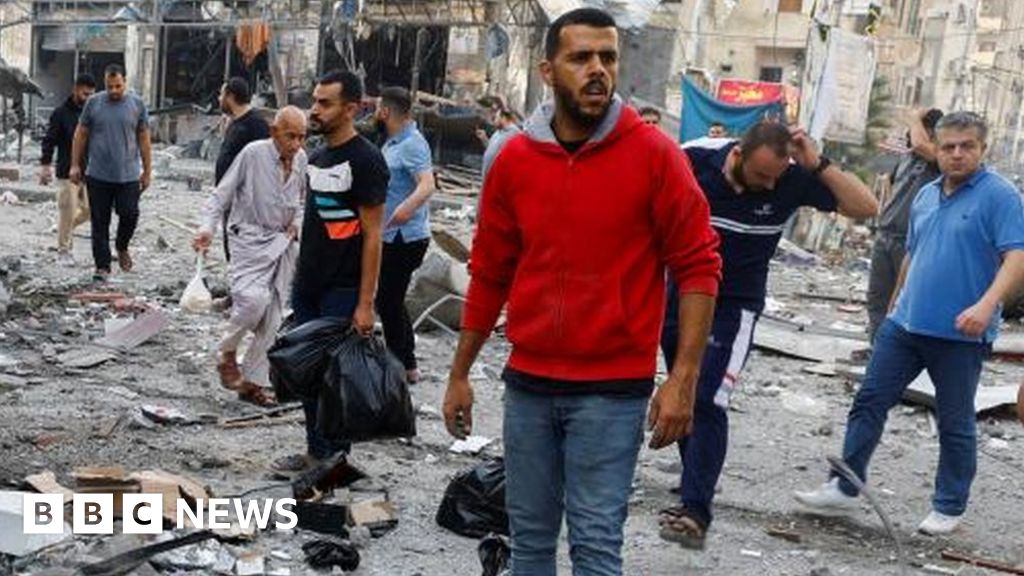- By Rushdi Abualouf
- BBC News
Large parts of Gaza have been destroyed by Israeli air strikes
As Israel intensifies its offensive on Khan Younis, Palestinians in Gaza have spoken of their fears for the future.
Some of the heaviest battles in Gaza in recent days have been around the southern city.
Already displaced families have been fleeing the area of the Nasser hospital, the largest still functioning in the territory.
More than 24,000 people have been killed in Gaza since Israel launched its response to the 7 October Hamas attacks, according to the Hamas-run health ministry.
The Hamas attack in Israel killed around 1,300 people, most of them civilians, and saw 240 hostages taken back to Gaza.
Israel says its air and ground operation in Gaza is aimed at destroying Hamas.
The majority of Gaza’s 2.3 million people are displaced and fight daily to find food, drink and medicine.
Mohammed al-Khaldi, a father of two children displaced from Gaza City, told the BBC: “I lost my home, my shop and my source of income. I am no longer able to provide the simplest requirements of life for my children.
“I hold the Israeli occupation responsible for the massive destruction, but I do not absolve Hamas of responsibility for everything that happened,” he said.
Hamas is the Palestinian group which has run Gaza since 2007. Its military wing, the Izzedine al-Qassam Brigades, was thought to have about 30,000 members before the 7 October attack.
“The worst thing that could happen is that we return to the previous situation, to a war every two or three years. The situation was difficult before the war and has become catastrophic now,” Mr Khaldi said.
“The prices of goods have risen tenfold and most basic necessities are not available. I wish to die a thousand times every day when I look into my children’s eyes and feel terrible helplessness because I am not able to feed them.”
Most of the people I spoke to in Khan Younis said that the Israeli army was advancing towards the city centre.
They are working underground more than above ground, said Naji Mahmoud, one of the displaced people from Gaza City. Mr Mahmoud witnessed a major Israeli attack that took place in northern Gaza and left for Khan Younis during the week-long humanitarian truce at the end of November.
“We feel that the ground is shaking under us, something like an earthquake, and this is repeated almost every evening, the bombings seem to target the tunnels,” he told the BBC. “When we were in Gaza [City], most of the attacks were from the air.”
Watch: Israel-Gaza 100 days: The scale of destruction
Manifestations of security breakdown are spreading throughout Gaza, and people are complaining about the phenomenon of theft and armed robbery.
A journalist who requested anonymity told the BBC: “I was returning from my job in Rafah late at night. I had three masked people stop me – they were carrying knives, and one of them was carrying a gun.
“They searched the car for anything valuable. One of them noticed that I was a journalist and allowed me to leave.”
On the streets of Rafah masked police officers with guns in police cars can be seen, but people are complaining that they are not doing enough to deter merchants who monopolise goods and raise prices in an insane manner.
“I bought a bag of wheat marked Unrwa [the UN agency for Palestinian refugees] for $100 (£79; €92) – 10 times the original price. Why are the police not arresting the war traders who sell wheat most likely stolen from the UN aid agencies?” complained Mohammed Sheik Khalil.
“I can’t find milk for my baby, my son has autism and has not received treatment for months. I cannot calm him down, and his condition has deteriorated after we made great strides in treating him before the war.”
Hamas always worked according to emergency plans during the previous four wars, but this time it is different.
The Israeli army has destroyed the government system, killed a large number of security and police officers, and destroyed security headquarters and police stations, leaving ordinary crime uncontrolled.
Neveen Imadedin, a mother displaced from her home in Gaza City and now living in the southern town of Rafah, said: “We want the war to end but with a sustained long-term political solution. We want our state, not to return to the no-peace, no-war situation.
“Look what happened to us, thieves stole everything from my house, my clothes, home furniture and even solar panels.”
“My house is located in the western part of Gaza City and was hit by four shells from the Israeli tanks that were controlling the neighbourhood.
“We are displaced here in Rafah and before that [we were] in Khan Younis. We have no money and no home, the unstoppable wars between Hamas and Israel have destroyed our lives.”
A businessman called Mohammed agreed.
“We have lived under unjust rule for more than 16 years. Hamas imposed heavy taxes on us and now they have dragged us into a devastating war in which we lost our property, money and homes,” he told the BBC.
“I used to live in a good house and work in trade. Now what will we do? The crossings are closed, the company has been destroyed, and the house is not fit for habitation due to the destruction.
“The worst thing that could happen to us is that we return under Hamas rule when the war ends.”

Emily Foster is a globe-trotting journalist based in the UK. Her articles offer readers a global perspective on international events, exploring complex geopolitical issues and providing a nuanced view of the world’s most pressing challenges.








